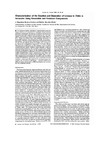Please use this identifier to cite or link to this item:
https://accedacris.ulpgc.es/jspui/handle/10553/514
| Title: | Characterization of the sorption and desorption of lindane to chitin in seawater using reversible and resistant components | Authors: | González-Dávila, Melchor Santana-Casiano, J. Magdalena |
UNESCO Clasification: | 251002 Oceanografía química | Keywords: | Lindano Agua de mar Análisis Quitina Adsorption Desorption, et al |
Issue Date: | 1992 | Journal: | Environmental science & technology | Abstract: | The lindane sorption-desorption experiments conducted using chitin as an adsorbent in seawater show that the partition coefficients decrease as adsorbent concentration increases and that sorption and desorption are not completely reversible at chitin concentrations lower than 10 g/L. These two effects have been analyzed in terms of a reversible-resistant two-component model of sorption-desorption. Further studies varying the temperature (from 5 to 45-degrees-C) and salinity (from 15 to 36 parts per thousand) were carried out to clarify the mechanisms responsible for these effects. The partition coefficients for the resistant and reversible components are found to behave quite regularly in all the experimental conditions: the reversible component is fairly constant in the range of 45 +/- 4 L/kg whereas the resistant component partition coefficient is inverse in relation to the chitin concentration, and it approaches zero when the chitin concentration is held at values higher than 10 g/L. The temperature and salinity do not affect the reversible component partition coefficient, and it is shown that the resistant component decreases both as temperature increases and as salinity decreases. Lindane sorption in different types of sites and to differing degrees can account for the observed effects. | URI: | https://accedacris.ulpgc.es/handle/10553/514 | ISSN: | 0013-936X | DOI: | 10.1021/es00025a008 | Source: | Environmental Science & Technology [ISSN 0013-936X], v. 26 (1), p. 90-95 |
| Appears in Collections: | Artículos |
SCOPUSTM
Citations
17
checked on Jun 8, 2025
WEB OF SCIENCETM
Citations
15
checked on Feb 1, 2026
Page view(s)
307
checked on Jan 16, 2026
Download(s)
232
checked on Jan 16, 2026
Google ScholarTM
Check
Altmetric
Share
Export metadata
Items in accedaCRIS are protected by copyright, with all rights reserved, unless otherwise indicated.
